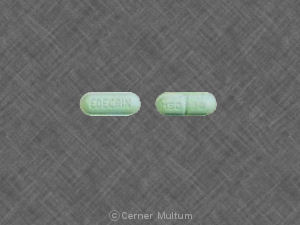Edecrin
Generic name: ethacrynic acid [ eth-a-KRIN-ik-AS-id ]
Drug class: Loop diuretics
What is Edecrin?
Edecrin is a loop diuretic (water pill) that prevents your body from absorbing too much salt, allowing the salt to instead be passed in your urine.
Edecrin is used to treat fluid retention (edema) in people with congestive heart failure, liver disease, or a kidney disorder such as nephrotic syndrome.
Edecrin may also be used for purposes not listed in this medication guide.
What are the possible side effects of Edecrin
Get emergency medical help if you have signs of an allergic reaction: hives; difficult breathing; swelling of your face, lips, tongue, or throat.
Edecrin may cause serious side effects. Call your doctor at once if you have:
-
severe or watery diarrhea;
-
hearing problems, feeling of fullness in your ear;
-
severe weakness, muscle cramps, numbness or tingling;
-
a light-headed feeling, like you might pass out;
-
sudden numbness or weakness, problems with speech or balance, chest pain, coughing up blood;
-
low potassium--leg cramps, constipation, irregular heartbeats, fluttering in your chest, increased thirst or urination, numbness or tingling, muscle weakness or limp feeling; or
-
low sodium--headache, confusion, slurred speech, severe weakness, vomiting, loss of coordination, feeling unsteady.
Common side effects of Edecrin may include:
-
nausea, vomiting, diarrhea, or other stomach discomfort;
-
trouble swallowing;
-
loss of appetite;
-
blurred vision;
-
fever, chills; or
-
headache, feeling tired.
This is not a complete list of side effects and others may occur. Call your doctor for medical advice about side effects. You may report side effects to FDA at 1-800-FDA-1088.
Related/similar drugs
Warnings
You should not use Edecrin if you are unable to urinate, or if you have recently had severe watery diarrhea.
Before taking this medicine
You should not use Edecrin if you are allergic to it, or if:
-
you are unable to urinate; or
-
you have recently had severe watery diarrhea.
To make sure Edecrin is safe for you, tell your doctor if you have:
-
cirrhosis or other liver disease;
-
an electrolyte imbalance (such as low levels of potassium or magnesium in your blood);
-
kidney disease;
-
gout; or
-
if you are on a low-salt diet.
Edecrin is not expected to be harmful to an unborn baby. Tell your doctor if you are pregnant or plan to become pregnant while using Edecrin.
It is not known whether ethacrynic acid passes into breast milk or if it could harm a nursing baby. You should not breast-feed while using this medicine.
Edecrin is not approved for use by anyone younger than 18 years old.
How should I take Edecrin?
Follow all directions on your prescription label. Your doctor may occasionally change your dose to make sure you get the best results. Do not use this medicine in larger or smaller amounts or for longer than recommended.
Take this medicine after a meal, unless your doctor tells you otherwise.
Edecrin will make you urinate more often and you may get dehydrated easily. Follow your doctor's instructions about using potassium supplements or getting enough salt and potassium in your diet.
While using Edecrin, you may need frequent blood tests and weight checks.
Store at room temperature away from moisture and heat. Keep the bottle tightly closed when not in use.
What happens if I miss a dose?
Take the missed dose as soon as you remember. Skip the missed dose if it is almost time for your next scheduled dose. Do not take extra medicine to make up the missed dose.
What happens if I overdose?
Seek emergency medical attention or call the Poison Help line at 1-800-222-1222.
Overdose symptoms may include dry mouth, increased thirst, mood changes, confusion, ringing in your ears, loss of appetite, vomiting, muscle pain or weakness, lack of energy, fast heartbeats, and little or no urination.
What should I avoid while taking Edecrin?
Avoid becoming dehydrated. Follow your doctor's instructions about the type and amount of liquids you should drink while you are taking Edecrin.
What other drugs will affect Edecrin?
Tell your doctor about all your current medicines and any you start or stop using, especially:
-
digoxin, digitalis;
-
lithium;
-
blood pressure medications;
-
an antibiotic (including those given through an IV);
-
a blood thinner--warfarin, Coumadin, Jantoven;
-
NSAIDs (nonsteroidal anti-inflammatory drugs)--aspirin, ibuprofen (Advil, Motrin), naproxen (Aleve), celecoxib, diclofenac, indomethacin, meloxicam, and others; or
-
steroid medicine--prednisone, dexamethasone, and others.
This list is not complete. Other drugs may interact with ethacrynic acid, including prescription and over-the-counter medicines, vitamins, and herbal products. Not all possible interactions are listed in this medication guide.
More about Edecrin (ethacrynic acid)
- Check interactions
- Compare alternatives
- Pricing & coupons
- Reviews (1)
- Drug images
- Side effects
- Dosage information
- During pregnancy
- Generic availability
- Drug class: loop diuretics
- Breastfeeding
- En español
Patient resources
Other brands
Professional resources
Related treatment guides
Further information
Remember, keep this and all other medicines out of the reach of children, never share your medicines with others, and use this medication only for the indication prescribed.
Always consult your healthcare provider to ensure the information displayed on this page applies to your personal circumstances.
Copyright 1996-2025 Cerner Multum, Inc. Version: 9.01.

